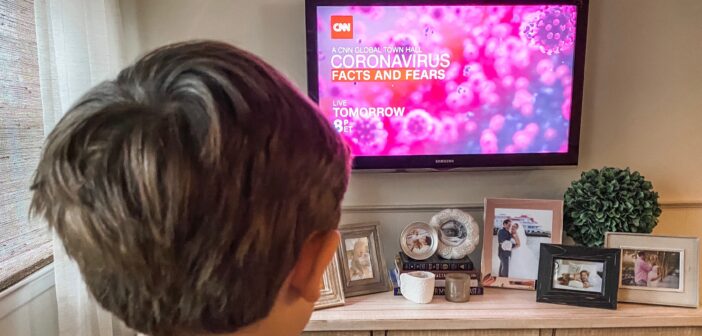Let’s admit it—being a parent during this global pandemic has a lot of unforeseen challenges. From trying to work from home while wrangling little ones to homeschooling our bigger kids to keeping our families healthy and safe, it’s all uncharted territory. And while we’re figuring this all out on the fly, our kids are asking questions. My four-year-old is as curious as they come, and I’ve been grappling with how to best explain this on his level. How can we put aside our own fears about this uncertain, scary time and be the calm, steady presence our children need right now? What’s appropriate to tell a four-year-old about the coronavirus pandemic? An eight-year-old? A teenager? We sat down with Dr. Liz Matheis, a child psychologist (who’s also one of our NJMOMprenuers) to give us mamas the professional guidance we need to help our kids understand what’s happening.
Dr. Liz advises that in circumstances like this, less is often more. Over-explaining or giving details that are too complex for children to understand can often add to anxiety. So, it’s important to keep things simple and age-appropriate. “Let children guide the conversation with their own questions,” says Dr. Liz. “Turn off the news when the kids are around and try to keep adult coronavirus conversations with your spouse or someone else mostly to yourself.” That means limiting talk about the newest death toll numbers, hospital overcrowding or other scary topics in earshot of the little ones. Another thing to think about is that to them, the biggest thing about this is how it affects them directly.
“For many kids, no matter the age, the hardest part of this to understand is the socialization. They want to know when they’ll get to see their friends,” says Dr. Liz. “You need to think about how to explain why they’re not seeing friends right now. I would say that we’re staying home so we’re safe and don’t get the virus, and so nobody else gets the virus.”
For preschoolers (5 and under)
“For this age group, I would only answer a question when a question is asked,” says Dr. Liz. “Preschoolers are happy in their own little world.” They may ask simply, what is this virus? Even for something so open-ended, she says less is more. “Keep your answers very brief. Don’t expand. Their ability to understand things outside of themselves is very limited. So, for them, it’s a question of how it is going to impact their lives. If they’re home, doing fun things and spending more time with mom and dad, they’re happy. Giving them too much information that they can’t understand could actually create anxiety,” says Dr. Liz. “Their awareness is very small. Satisfy the curiosity and then move on to what snack would you like, or do you want to draw?” she adds.
For elementary age (5-8 years old)
“School-aged kids are more aware because they are homeschooling,” says Dr. Liz. “Still keep to just answering questions, but give them a little bit more information.” As of now, it appears school closings are indefinite, and Dr. Liz advises once the staying home honeymoon phase wears off for them, the questions for kids this age could get a bit harder. “They’re going to realize it’s a disruption, not getting to see their friends or do activities. You should explain social distance alternatives like FaceTime playdates and virtual classes. Lastly, limit your information about the scope of the crisis so you don’t breed anxiety and use the routine and family time to help them through,” she says.
Tweens (9-12 years old)
Tweens are more in tune with what’s going on. “It’s good to initiate conversation and keep communication open. Ask them: what do you understand about this, what are your questions? What are your worries about this? Let them then guide the conversation with their questions. This is what I’ve done with my own daughter,” says Dr. Liz. Another thing to keep in mind: tween access to phones and computers. “Make sure you’re in control of what information they’re looking at. If they want to know something specific, tell them you will do the research and get them that information and keep it concise. There are a lot of headlines that can be shocking or overwhelming to a tween that are too much or too heavy for them to grasp,” she says. One more thing to think about with this age group is getting them to see the bigger picture of why we’re social distancing. “We’re inside our home, slowing down the spread, washing our hands, we’re doing our part. You can focus on the proactive part of everything we’re doing to help society at large because tweens can begin to understand that,” says Dr. Liz.
Teens and adolescents (13+)
Teens have access to everything, so they are up on the latest news, and even may know more about it than you do. When that happens, you want to be prepared. “I would ask what they’re thinking about this and be prepared for the conversations to be much more complex. My teenager has surprised me with some of the things he’s brought up,” says Dr. Liz. Keep in mind how invested teenagers are in their friendships and how hard this is in that respect. “Suggest doing virtual hangouts, like watching a movie as a group together via FaceTime or Google Hangout, choose something from Netflix, all watch together, eat popcorn and talk about it just like they would in person,” she says. Lastly, it’s important to have big picture thinking and to use that as teaching moments for teens. “Focus on the scope of the entire world being impacted, and how our social responsibility impacts others and can have a major effect.”
Things to look for
Dr. Liz notes there are some signs to watch for if you’re concerned about your child’s anxiety through this pandemic. “If they’re overeating or undereating, sleeping a lot or not at all, or if they have a heightened level of agitation, explosiveness. For younger kids, it means more meltdowns. Any change like that you’re noticing could be anxiety-related,” she says. “That’s a cue to ask—are you okay? Is something on your mind? Tell me what’s bothering you. Reassure them you’re here, you’re the parent, you’ll be okay, mommy and daddy are here and you’re safe,” says Dr. Liz.
And as with most things in parenting, consistency amongst the chaos helps. “Think about bringing everyone together at night when work is done. We all have time now, take advantage of that by playing a game, watching a show or reading together each night. Being together is a good way to decompress with everything going on. And keep the door of communication open,” she adds.
For more information about Dr. Liz Matheis and her practice Psychological and Educational Consulting of NJ, check out her website, Facebook and Instagram.








